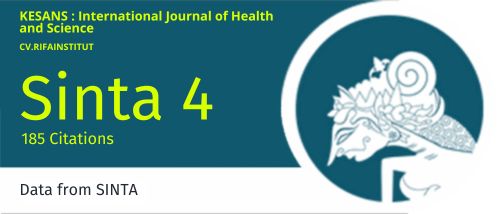The Food Consumption Type and Nutritional Status of Pregnant Women in Baqui Community Health Centre, Pante Makasar Sub-Region, RAEOA, 2024
DOI:
https://doi.org/10.54543/kesans.v5i1.465Keywords:
Food Consumption Type, Nutritional Status, Pregnant WomenAbstract
Introduction: Pregnant women are in a period that determines the quality of human beings in the future because it develops the child's body through the condition of the fetus, in the mother's womb. Objective: The purpose of the research was to find out the Relationship of Food Consumption Type to the Nutritional Status of Pregnant Women. Method: The method used in this research is a quantitative study approach (Cross-Sectional), with a population of 130 mothers who brought their children to treatment at Baqui Health Centre. The data analysis technique used is Chi-square, and the analysis was conducted using SPSS version 22.0. Result and Discussion: Based on the results and discussion on the Relationship of Food Consumption Type (X1) Nutrition Status (Y) in Baqui Community Health Centre, 2024 finally showed that of the 32 respondents who gave answers on the Food Consumption Type Relationship with the category of Good Normal (15.6%), 31%, Less (31%) and less category Naton Normal (46.9%), Less (6.3%). It means that the type of food consumption is good, but it is applied to the intervention. Then the chi-square test at alpha (ɑ) 0.05 showed that the p-value = 0.01. Conclusion: To conclude that there is a significant relationship between the type of food consumption and the nutritional status of pregnant women with a p-value of 0.01 (p<ɑ 0.005). It is recommended to the Ministry of Health and the Baqui Health Centre, especially the communities, to draw up and plan the program and continue to improve health education for mothers about nutritious food consumption
Downloads
Published
How to Cite
Issue
Section
Citation Check
License
Copyright (c) 2025 Aniceto da Conceicao Pacheco, Levi Anatolia S.M. Exposto, Adelaide Viegas do Rosario, Marilia Juvi Goncalves, Honoria de F. P. Carvalho, Marcos Carvalho

This work is licensed under a Creative Commons Attribution-ShareAlike 4.0 International License.





















